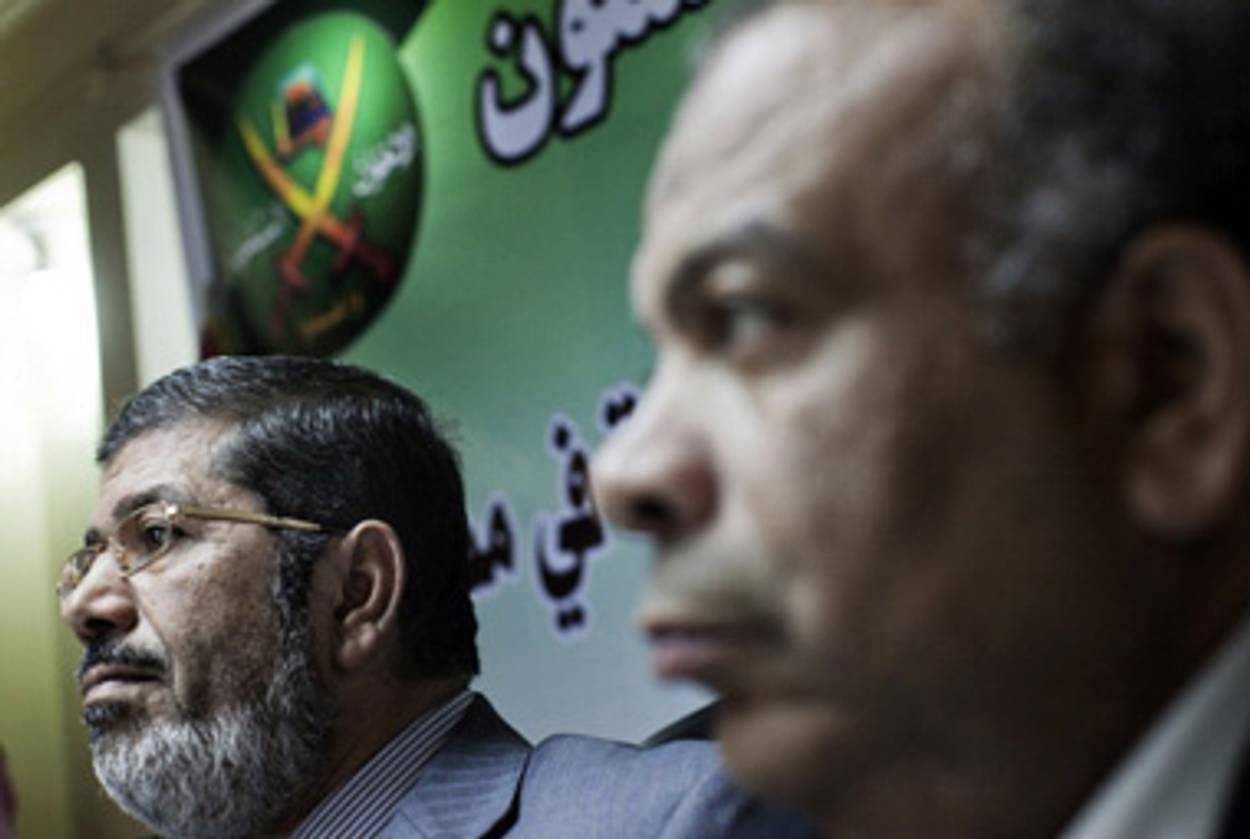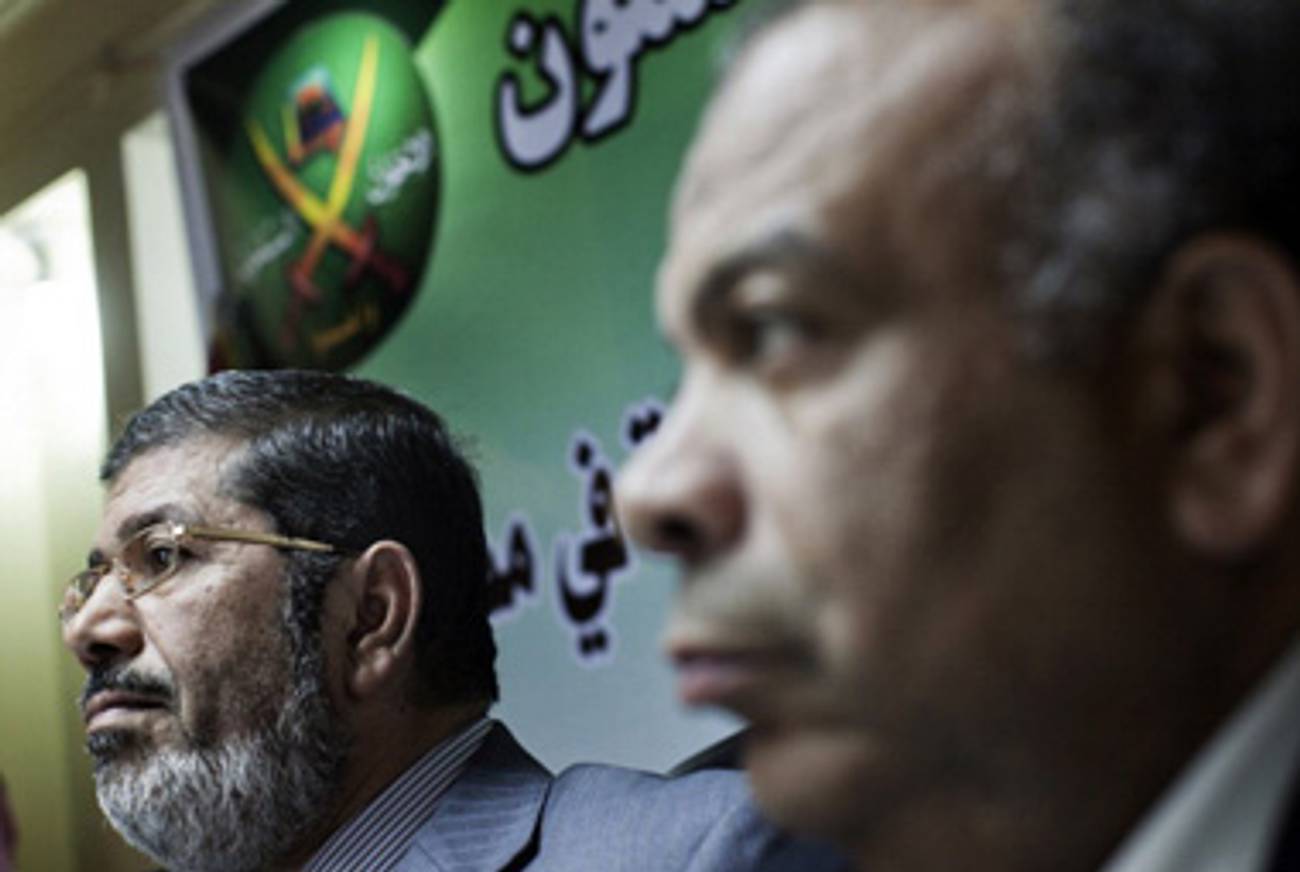The Brotherhood Goes Mainstream
Why allowing the Islamist group to nominate candidates is the right call




Egypt’s Muslim Brotherhood will form an actual political party–it was banned under President Hosni Mubarak—and compete in upcoming elections (last weekend, it pledged not to seek the presidency). It will also send a representative to the nascent, military-supervised constitutional convention. This news should prompt us to look again at the question: Who is the fundamentalist Islamist group, what does it want for Egypt, and should we be concerned about its influence?
While of course no one knows, several varying and credible voices—from Jackson Diehl writing in the Washington Post to Samer Shehata speaking to me—have asserted that a Muslim Brotherhood-backed Egyptian government would not abrogate the Israeli peace treaty. As Shehata noted, “Although most Egyptians are very concerned about regional issues, including the plight of the Palestinians, not an inch of Egyptian land is occupied. There is no Golan Heights. … it won’t be popular or a winning electoral platform to say, ‘Let’s cause trouble with Israel.’” (And indeed, the argument that the revolution will ultimately lead to greater stability relies precisely on the fact that, in a democracy, electoral platforms matter.) No wonder the Brotherhood all but disowned words of support from Iran and its Lebanese proxy, Hezbollah; it insists, rather, that it “regards the revolution as the Egyptian people’s revolution, not an Islamic revolution.”
Diehl’s take is novel and persuasive: A democratically elected Egyptian government that honors the treaty but maintains an otherwise cold and only somewhat helpful peace with Israel—the most likely outcome—will, he argues, be barely different from the Mubarak-run government that has been in place for the past three decades. Actually, there will be one difference: “The first benefit of a democratic Egypt,” he maintains, “will be a government that will have to take responsibility for its policies, instead of tacitly blaming them on the United States—and extracting unnecessary bribes from Washington. It will have to defend its policies to its own people—which means, for example, that it will have an incentive to check rather than promote anti-Semitic propaganda.”
One dynamic that has emerged through the din of voices opining on the Brotherhood is the generational divide between the elders, who hold the party’s nominal reins and, perhaps due to having suffered decades of persecution by Egypt’s autocratic regimes, are fairly hard-line when it comes to its Islamism, and the youth, who have the numbers and the energy and are not nearly so dogmatic. One need not be a starry-eyed optimism to bet on The Brotherhood Youth, who, as Sarah A. Topol reports in Slate, were out on Tahrir Square from day one, against the old folks, who waited several days and joined the youth-initiated Revolution only when it became clear that they had no other choice.
The Supreme Military Council is clearly pursuing a strategy of involving the Brotherhood in the nascent democratic transition. Again, it is difficult not to think that is the right call. The Muslim Brotherhood is not going away overnight—if it didn’t go away during three decades of being banned under a police state, it is certainly not going to go away now that it is street-legal—and so the least their ideas are inhibited from coming out into the open, the more quickly we will be able to perceive its true colors. This was Bruce Riedel’s suggestion to me two weeks ago: “We should certainly test the Muslim Brotherhood, test if their commitment to nonviolence and a political process is sincere,” he said. “It’s an inherent unknown, but the best way to find out is to engage it and talk with it and not demonize it.” Adds Carrie Rosefsky Wickham in Foreign Affairs, “Over time, other parties—including others with an Islamist orientation—may provide the Brotherhood with some healthy competition and an impetus to further reform itself.” She concludes, “The Brotherhood has demonstrated that it is capable of evolving over time, and the best way to strengthen its democratic commitments is to include it in the political process, making sure there are checks and balances in place to ensure that no group can monopolize state power and that all citizens are guaranteed certain freedoms under the law.”
“Egypt’s was a revolution of diversity, a proliferation of voices—of youth, women and workers, as well as the religious—all of which will struggle for influence,” Anthony Shadid wrote over the weekend in the Times. “Here, political Islam will most likely face a new kind of challenge: proving its relevance and popularity.” He adds, “The next elections promise to be far more competitive than the shams of past years, when many Egyptians simply stayed home. That emerging diversity may prove more uncomfortable than the head-to-head confrontation with Mr. Mubarak’s enforcers that helped define the Brotherhood’s appeal.”
We’re not going to end up with Jeffersonian democracy in Egypt, at least not for a significant period of time—personally, I think Gideon Rachman’s guess that we should hope for something somewhere between Pakistan and Turkey seems fair—but that doesn’t mean the basic trappings aren’t a similarly good idea there.
Muslim Brotherhood to Form Party [WP
Muslim Brotherhood Says It Will Not Run for Presidency [JPost]
Foreign Islamists Get Little Support in Egypt [WSJ]
The Upsides of Egypt’s Revolution [WP]
Sibling Rivalries [Slate]
‘Brothers’ in Egypt Present Two Faces [WSJ]
The Muslim Brotherhood After Mubarak [Foreign Affairs]
Egypt’s Path After Uprising Does Not Have To Follow Iran’s [NYT]
Reflections of the Revolution in Egypt [FT]
Earlier: Why Egypt Can Handle Democracy
Will The Real Brotherhood Please Stand Up?
Marc Tracy is a staff writer at The New Republic, and was previously a staff writer at Tablet. He tweets @marcatracy.